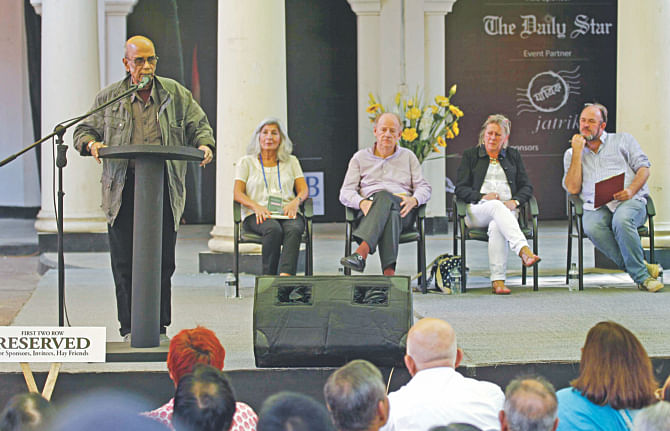Lit fest begins

Celebrating cultural diversity, Hay Festival Dhaka 2014 began yesterday morning on the Bangla Academy grounds with the promise to transcend the boundaries of nations through literary and intellectual exchanges.
Poets, writers, artists and literature lovers from different parts of the world were welcomed with rendition of Nazrul songs, performed by Bangla Choir, on the lawn behind the historic Burdwan House.
In his inaugural speech, John Ralston Saul, president of PEN International, a non-political organisation which connects the international community of writers, paid tribute to the Bengali Noble laureate Rabindranath Tagore and Bangladesh's national poet Kazi Nazrul Islam.
"Their poetry reflects what the people of this country want to be," said Saul, author of 14 books which have been translated into 25 languages in 36 countries.
Saul stressed that great literature is profoundly local. He also reminded the audience of the significance of the Bengali language movement.
"It is your responsibility to defend the endangered languages of this region," he said addressing the people of Bangladesh.
Welcoming everyone to the three-day festival, eminent Bangladeshi poet and novelist Syed Shamsul Haq stressed the importance of holding a global literary festival on the Bangla Academy grounds, the prime cultural venue of the country.
“We are living in a time when lie prevails over truth and we are facing fanaticism every day,” said the noted litterateur. “It is only in arts that truth prevails.”
Noted historian and author William Dalrymple talked about the tradition of literary festivals in South Asia while Lyndy Cooke, festival director of the original Hay, emphasised the growing popularity of Hay in the whole world.
The word on the importance of building an inclusive society that celebrates creativity, welcomes dissenting views and independent thinking, and challenges the status quo, came from Mahfuz Anam, editor and publisher of The Daily Star, the title sponsor of the event.
The inaugural session was moderated by award winning Bangladeshi novelist Tahmima Anam who is also one of the festival directors.
After a short break for snacks, the first five sessions started off concurrently at different venues including the academy's main auditorium.
While three young writers from India and Bangladesh talked about how cities were portrayed in their books written in English, old and young writers including eminent Bangladeshi novelist Selina Hossain debated how to tell stories in the rapidly changing times inside the Cosmic Tent.
Poems in Chak, Bom, Murong and ten other indigenous languages enthralled audience in the morning. More poems were rendered throughout the day with Bengali poet Joy Goswami drawing attention of the evening crowd on the lawn.
Right after lunch, literary critics Dwight Garner of New York Times and Carolyn Kellogg of Los Angeles Times shared the main stage with Issac Fitzgerald, editor of BuzzFeed books, the website that recommends books.
Speakers at the session opined that despite the perceived fear that newspapers might face extinction, prints and e-books would enjoy a co-existence.
Setting the mood aptly in the evening, elements from the spirit world settled under the Bottola with stories read out from a compilation of ghost stories shared by listeners of Bhoot FM, a popular programme of Radio Foorti.
BOOK LAUNCHES
A total of four books were launched on the first day of the festival. Bengal Publications launched two short story collections, 'Ghost Alley' by Javed Jahangir and 'Piazza Bangladesh' by Neeman Sobhan while Bengal Lights Books launched Ameer Hossain's short story collection 'Electric Shadows'. Drik launched a book of photography 'Bangladesh Seen From Within' marking its 25th anniversary.

 For all latest news, follow The Daily Star's Google News channel.
For all latest news, follow The Daily Star's Google News channel. 



Comments